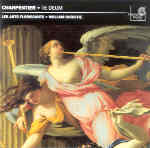This is one of the most beautiful SACDs that I have heard to date, and it was recorded way back in 1988. I suppose the lesson here is that great recordings make great SACDs, even in 4.0 multichannel format, and the fact that the performances fully match the production’s technical distinction doesn’t hurt either. With a choir that included such big names as Véronique Gens and Gille Ragon, William Christie directs stunning performances as noteworthy for their beautiful sonority as for their clarity and idiomatic rightness of expression.
The trumpets and drums of the Te Deum sound just spectacular in the acoustic of the church of Notre Dame du Travail in Paris. All that remastering to SACD has done is create an extra depth of sonority, placing the listener in what seems like a vast acoustic space, but one that at the same time never swallows important instrumental detail. And so the more intimate scoring of Missa “Assumpta est Maria” and the positively austere Litanies de la Vierge (for six voices and two treble viols) never get lost in a wash of reverberation–instead they float in space with an aptly mystical aura. If you enjoy multichannel sound then you simply have to hear this disc. It’s a marvel.
































